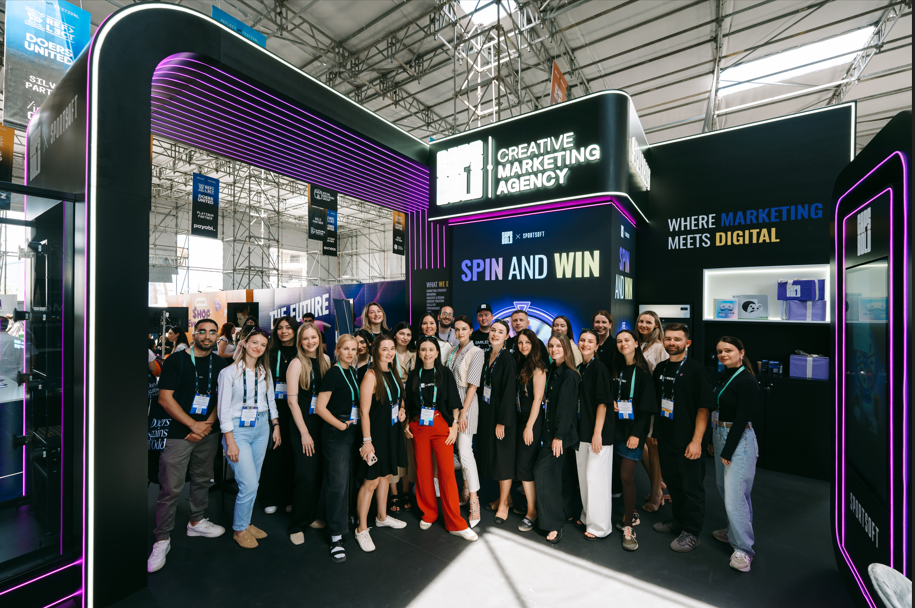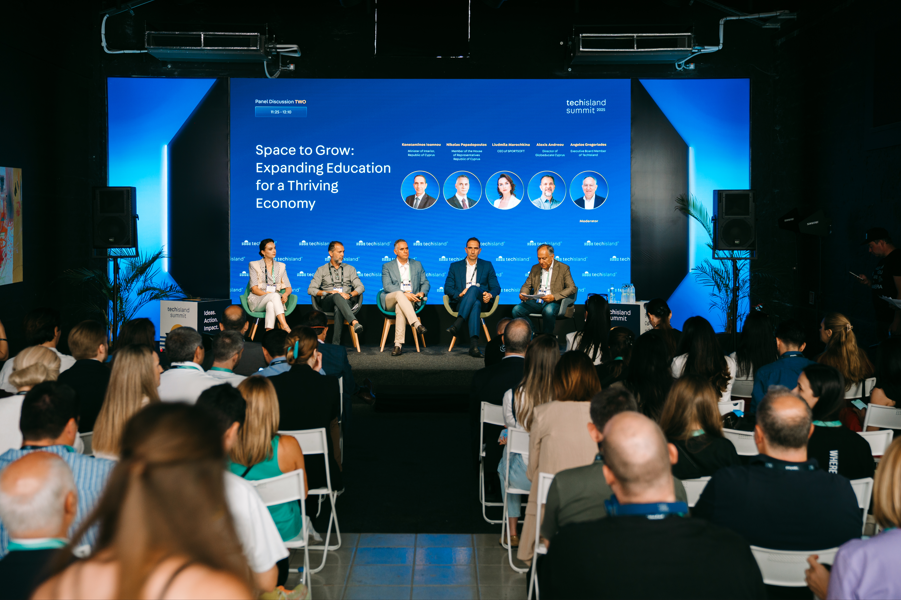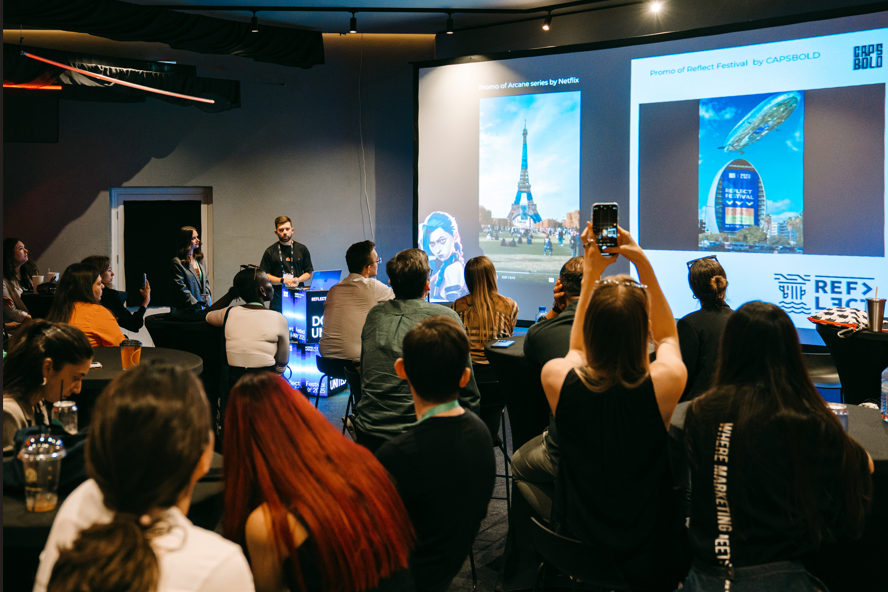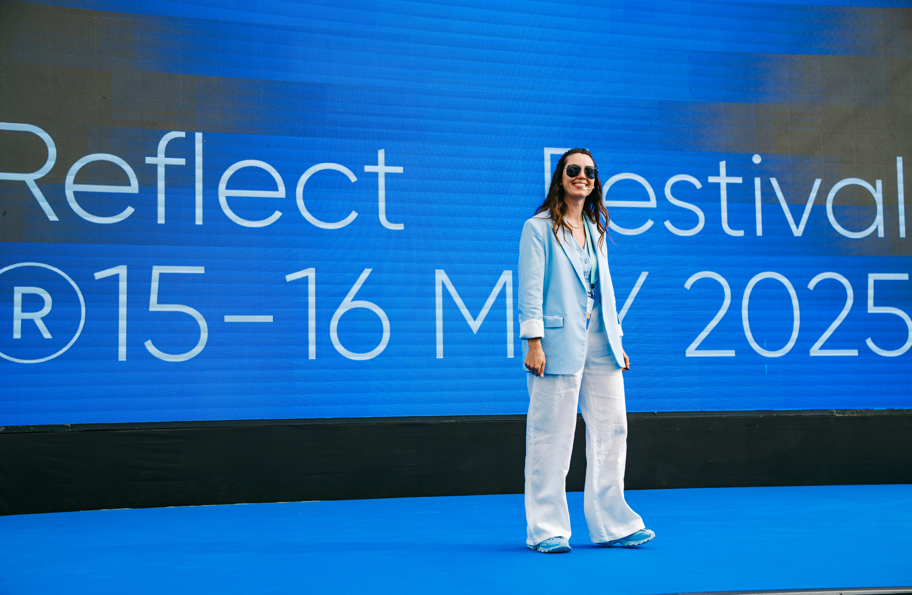During Reflect Festival 2025, the largest technology and entrepreneurship event in Eastern Europe, the Middle East, and North Africa, Olga Loktionova, PR Director at the creative agency CAPSBOLD, delivered a keynote on the strategic role of marketing in the tech industry.
For the second consecutive year, CAPSBOLD returned as the festival’s official marketing partner, this time sharing a joint booth with the tech company SPORTSOFT under the theme ‘Agencies of the Future: Where Marketing Meets Digital’.

As part of the event, the two teams took part in a series of high-profile engagements.
Among them, Liudmila Marochkina, CEO of SPORTSOFT, participated in the TechIsland Summit panel ‘Space to Grow: Expanding Education for a Thriving Economy’, where she spoke about the urgent need to make educational technologies more accessible.

Meanwhile, CAPSBOLD’s Marketing Manager Oksana Baikova and Marketing Lead Denis Lukyanov hosted a practical workshop titled ‘Global Marketing Trends 2025: What Matters, What Works, and What to Do About It’, exploring how AI, data and brand purpose are driving the next wave of global campaigns.

However, it was Loktionova’s keynote that captured the central theme of the day: marketing is no longer a ‘nice-to-have’ in tech – it’s the engine of growth.
“A great product is not enough. Without a story, it gets lost,” she said, adding that innovation without strategy rarely gains traction.
She explained that in today’s digital age, attention has become the most valuable currency. With people bombarded by over 6,000 ads a day, but remembering only a few, brands that want to survive must engage emotionally, clearly and consistently.
She referred to research showing that more than 70 per cent of tech leaders today are companies that heavily invested in marketing.
According to Loktionova, names like Zoom and Slack didn’t just rely on product quality; they built narratives that resonated emotionally and strategically.
By contrast, she pointed to some of the tech world’s most high-profile failures. Google Wave, Microsoft’s Windows Phone and Segway, all had potential, she said, but failed because of unclear positioning, premature launches or a total absence of storytelling.
“Google Wave was technically innovative, but most users didn’t understand what it was for,” she said.
“Microsoft spent years trying to compete with iPhone and Android, but never captured more than 3.6 per cent of market share.”
As for Segway, a product once expected to revolutionise personal transport, it sold just 140,000 units over nearly two decades.
“In all three cases,” Loktionova said, “confusion killed the product. There was no specific target audience, no compelling narrative, and no emotional connection with users.”
She then contrasted these cases with examples where marketing didn’t just drive sales, it built movements.
During the COVID-19 pandemic, Zoom didn’t simply meet demand.
As Loktionova noted, the company leaned into transparency and communication. CEO webinars, strategic partnerships with Slack and Salesforce, and the launch of Zoom Academy helped it increase revenue by 300 per cent in a single year.
She also referred to Spotify Wrapped, not as a campaign, but as a “movement.”
The annual data-driven experience engaged over 90 million users in 2023 through a mix of timing, emotional resonance and personalisation, all without spending a cent on advertising.
Tesla, she continued, is another standout case.
“He doesn’t follow the rulebook. He is the brand,” she said, referring to Elon Musk.
Despite never relying on traditional advertising, Tesla reached a $1 trillion market capitalisation in 2021, driven largely by spectacle and strong brand narrative.
The rise of ChatGPT also came up as a key example. It became the fastest-growing consumer app in history, reaching one million users in five days and 100 million in just two months.
In 2024, OpenAI spent $7 million for a 30-second Super Bowl ad, which drew 115 million views.
According to Loktionova, what started as viral curiosity quickly became a dominant brand, backed by global partnerships and well-executed storytelling.
She went on to explore how artificial intelligence is now reshaping marketing across the board. Tools like Junbi.ai and Expoze.io, she said, provide real-time insights into ad performance and creative effectiveness, and they are already changing the way brands make decisions.
Bloomberg Intelligence, she added, estimates that AI-powered digital advertising will reach €175 billion annually by 2032.
Hyper-personalisation, in her view, is at the core of this shift. Airbnb, for example, uses AI to tailor follow-up emails and boost engagement.
Porsche has embraced AI-generated content and virtual influencers across platforms like Instagram and TikTok. In China, the virtual influencer market grew from €860 million in 2021 to €2.8 billion by 2023.
Meanwhile, Nike has seen a 23 per cent increase in click-through rates and a 15 per cent rise in conversions thanks to AI-led personalised campaigns.
She also emphasised broader industry investments.
Accenture, for instance, is putting €2.7 billion into AI and plans to double its specialist workforce from 40,000 to 80,000 to meet growing global demand.
“When we launched CAPSBOLD in Cyprus, we used CGI videos and 3D reels. These tools evoke emotions, they grab attention, and they get remembered,” she said.
As for AI’s growing role in creativity, Loktionova encouraged marketers to be curious rather than fearful. “We shouldn’t be afraid of AI coming into our lives,” she said.
“We are humans – we have our heart and brain. It’s our power.”
Today, CAPSBOLD operates across more than 10 time zones with a team of over 400 specialists. Its latest projects, including campaigns for BEONIX and Reflect Festival, continue to combine creativity, storytelling and data-led strategy.
According to the company’s 2025 Marketing Trends Report, companies that actively invest in marketing are not only 60 per cent more likely to experience revenue growth, but also three times more likely to increase their market share.
“Innovation without communication doesn’t spread. Products without stories don’t scale,” Loktionova concluded.






Click here to change your cookie preferences